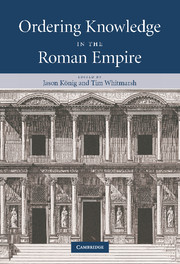Book contents
- Frontmatter
- Contents
- Preface
- Notes on contributors
- List of abbreviations
- Part I INTRODUCTION
- Part II KNOWLEDGE AND TEXTUAL ORDER
- Part III KNOWLEDGE AND SOCIAL ORDER
- 8 Knowledge and power in Frontinus' On aqueducts
- 9 Measures for an emperor: Volusius Maecianus' monetary pamphlet for Marcus Aurelius
- 10 Probing the entrails of the universe: astrology as bodily knowledge in Manilius' Astronomica
- 11 Galen's imperial order of knowledge
- Bibliography
- Index
11 - Galen's imperial order of knowledge
Published online by Cambridge University Press: 28 August 2009
- Frontmatter
- Contents
- Preface
- Notes on contributors
- List of abbreviations
- Part I INTRODUCTION
- Part II KNOWLEDGE AND TEXTUAL ORDER
- Part III KNOWLEDGE AND SOCIAL ORDER
- 8 Knowledge and power in Frontinus' On aqueducts
- 9 Measures for an emperor: Volusius Maecianus' monetary pamphlet for Marcus Aurelius
- 10 Probing the entrails of the universe: astrology as bodily knowledge in Manilius' Astronomica
- 11 Galen's imperial order of knowledge
- Bibliography
- Index
Summary
Order (taxis) is a vital matter for the great imperial physician Galen of Pergamum. Sound method (in all things) depends on it: on beginning at the beginning and proceeding systematically through all the requisite stages until the goal is attained. It is, moreover, a test that most in the medical field fail. Galen's total commitment to good order provides him with a measure against which his rivals (past and present) can be measured and found wanting: it creates an important space within which his superiority can be asserted once again. Thus, for example, he makes order a key dividing line between Rationalists and Empiricists in On the therapeutic method, suggesting that it underlies the epistemological gap between these two medical groupings. The latter, he avers, solve problems and make discoveries in a disorderly fashion – through what they happen to observe, through chance experience – while the former lay claim to an orderly and logical approach to the acquisition and consolidation of knowledge. Their delivery is poor, however, and most Rationalists fail to start at the beginning; they also recapitulate received wisdom rather than actually working through a line of reasoning or argument. Two types of taxic failure are thus demonstrated, and duly criticised, allowing the virtues of the Galenic model to shine through all the more clearly. It is stated more positively, and practised, in many of his tracts and treatises: proper order is always asserted, and essayed, in his various enquiries and disquisitions.
- Type
- Chapter
- Information
- Ordering Knowledge in the Roman Empire , pp. 241 - 277Publisher: Cambridge University PressPrint publication year: 2007
- 8
- Cited by



